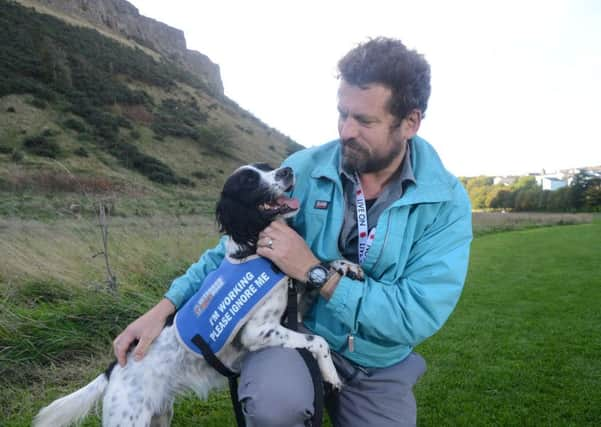Ex-soldier left humiliated after assistance dog barred from Edinburgh flight


Neil Marshall, 47, with pet comrade Arbhair was due to fly to Bristol when Easyjet staff blocked boarding to the three-year-old English springer spaniel.
A former Royal Engineer and bomb disposal expert, Mr Marshall has struggled with the mental illness for years and finds it difficult to cope with crowds.
Advertisement
Hide AdAdvertisement
Hide AdArbhair – pronounced Ar-vair – the first Partner Animal Life Skills dog in Scotland, accompanies Mr Marshall everywhere, including on trips which could trigger his PTSD, to keep him calm and offer support. The pair have flown with the airline many times before with no issues. But staff at the Easyjet boarding gate refused to let them on the flight causing
Head of training at charity Veterans for Dogs, who had helped train Arbhair, Kirsten Dillon was fortunately travelling with the pair and was able to step in.
“If I hadn’t been there the impact on Neil would have been catastrophic. He would have frozen, he wouldn’t have known what to do, he may have become reactive,” she said. “After an event like that Neil will take days and days to recover.” Kirsten said it was imperative Easyjet train their staff across the board, including handling agents. “In this situation Easyjet told the handling agents that they ‘don’t speak to passengers’,” Kirsten said. “They need to understand that mental health dogs are legitimate – they are not emotional support dogs, they are probably more highly trained than physical support dogs and as a trainer of both I can say so.
“These assistance dogs are dealing with a person’s anxieties. When you say they save lives, it is a literal meaning – guys will speak openly about their dogs interrupting suicide attempts.”
Advertisement
Hide AdAdvertisement
Hide AdNeil, who served for 12 years including tours in Bosnia also has a head injury affecting his short term memory and speech. He added: “Easyjet had been quite easy to work with up until then and I was left shaken. Luckily Kirsten was there – she had to deal with it because I would have been unable to process the information and what was going on.”
An Easyjet spokeswoman said: “In line with CAA guidelines, the carriage of guide dogs on aircraft is strictly controlled and so these dogs must be trained by accredited assistance dog organisations to be in the aircraft cabin with their owner. As Veterans With Dogs works with an accredited organisation Mr Marshall should have been able to travel.